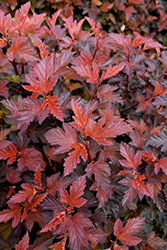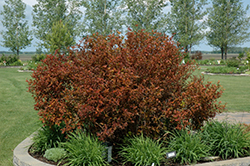Plant Search
Coppertina® Ninebark
Physocarpus opulifolius 'Mindia'
Height: 7 feet
Spread: 7 feet
Sunlight:
![]()
![]()
Hardiness Zone: 2
Other Names: Eastern Ninebark
Brand: Proven Winners
Description:
Quite the colorful shrub, this garden beauty boasts coppery-orange-red new foliage in spring that fades to a dark reddish-purple, which sets off the white flowers spectacularly; a relatively compact variety that will grow nearly anywhere
Ornamental Features
Coppertina® Ninebark features showy clusters of white flowers at the ends of the branches from late spring to early summer, which emerge from distinctive pink flower buds. It has attractive burgundy deciduous foliage which emerges coppery-bronze in spring. The serrated lobed leaves are highly ornamental and turn an outstanding scarlet in the fall. It features abundant showy red capsules from early to mid fall. The peeling tan bark and antique red branches add an interesting dimension to the landscape.
Landscape Attributes
Coppertina® Ninebark is a multi-stemmed deciduous shrub with an upright spreading habit of growth. Its average texture blends into the landscape, but can be balanced by one or two finer or coarser trees or shrubs for an effective composition.
This shrub will require occasional maintenance and upkeep, and can be pruned at anytime. It has no significant negative characteristics.
Coppertina® Ninebark is recommended for the following landscape applications;
- Accent
- Mass Planting
- Hedges/Screening
- General Garden Use
Planting & Growing
Coppertina® Ninebark will grow to be about 7 feet tall at maturity, with a spread of 7 feet. It has a low canopy, and is suitable for planting under power lines. It grows at a medium rate, and under ideal conditions can be expected to live for approximately 30 years.
This shrub does best in full sun to partial shade. It is very adaptable to both dry and moist locations, and should do just fine under average home landscape conditions. It is not particular as to soil type or pH. It is highly tolerant of urban pollution and will even thrive in inner city environments. This is a selection of a native North American species.



